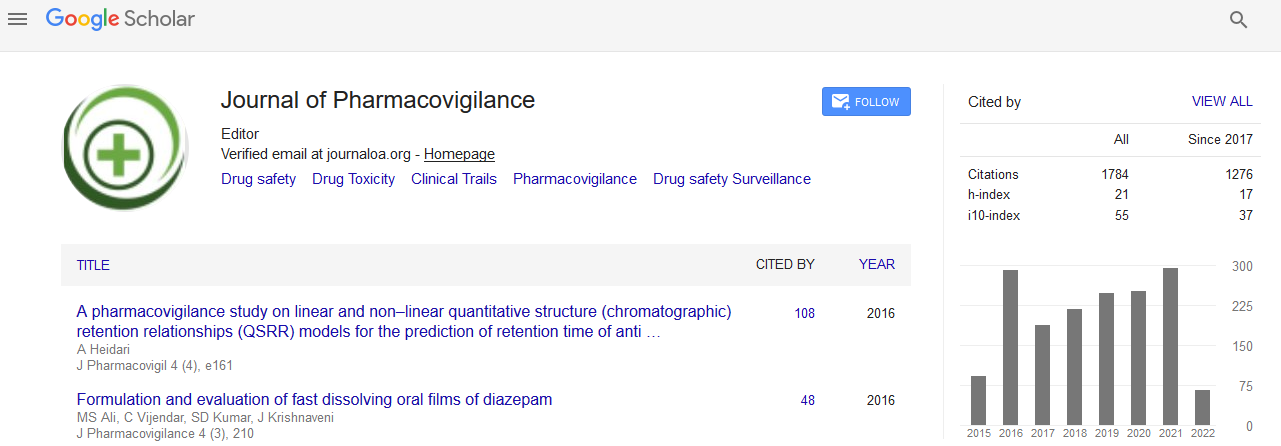Indexed In
- Open J Gate
- JournalTOCs
- The Global Impact Factor (GIF)
- RefSeek
- Hamdard University
- EBSCO A-Z
- OCLC- WorldCat
- Publons
- Euro Pub
- Google Scholar
Useful Links
Share This Page
Journal Flyer

Open Access Journals
- Agri and Aquaculture
- Biochemistry
- Bioinformatics & Systems Biology
- Business & Management
- Chemistry
- Clinical Sciences
- Engineering
- Food & Nutrition
- General Science
- Genetics & Molecular Biology
- Immunology & Microbiology
- Medical Sciences
- Neuroscience & Psychology
- Nursing & Health Care
- Pharmaceutical Sciences
Role of Pharmacovigilance and Pharmacoepidemiology in risk management
3rd International Conference and Exhibition on Pharmacovigilance & Clinical Trials
October 27-29, 2014 Hyderabad International Convention Centre, India
Chanakya Patel
Posters: J Pharmacovigilance
Abstract:
The human history can never be obliterating at the cost of human lives due to drug related catastrophes. With the emerging new healthcare environment, safety and risk/s with health care product/s should be continuously explored. Pharmacoepidemiology is the study of determination of medicinal product in large number of population with different demographic & traditional variables. The risk assessment of any therapeutic agent or regimen begins from early stage of its development and continues throughout its life cycle. The principle involved in pharmacoepidemiology is the art of using the sciences and its tools to generate information regarding ?what known and what unknown?; ?wanted and unwanted outcomes?, including associated risks in the post-marketing environment with the health care product/s. The skill in the matrix of pharmacoepidemiology study is constructed on three basic components: A knowledge based approach, a conceptual framework, and an interpretive framework. From these perspectives, one can initiate, establish and strengthen surveillance schemes, or understand a masquerade research question, select strategies, apply methodologies, and interpret the results of purposeful investigations. When proactively and conveyed appropriately interpreted results of a properly conducted risk assessment which can be used in regulatory decision-making. Pharmaceutical sponsors and/or drug regulatory agencies according to local and international requirements should initiate more epidemiologic studies for products where association of risk or prevalence of risk/s is/are higher. Depending on the nature of the result and the regulations in effect, the result may need to be reported in an expedited manner (e.g. as ?new relevant safety information?). In any case, companies in their periodic aggregated regulatory reports, such as Periodic Safety Update Reports (PSUR) or Periodic Adverse Drug Event Repot (PADER) and similar regulatory documents, should include results of all epidemiologic studies for product safety.
Biography :
Chanakya Patel has completed my Master?s degree in Clinical Research (MSc) from Cranfield University, UK; Post Graduate Diploma in Clinical Research Management, ICRI & Bachelors in Pharmacy, RGUHS. During his tenure he has organized & delivered various presentations on Clinical Trials, Pharmcovigilance, Regulatory compliance in various Workshops/Conferences/Colleges at National level (CpHI, etc) and International level (Informa Life sciences, London & Germany). He has started his career as a Pharmacist and now working as Assoicate Pharmacovigilance. Previously he worked as a Technical Data Associate with CDSCO Zonal Office Ahmedabad, Ministry of Health & Family Welfare, Government of India on contractual basis, Pharamcovigilance Officer at Wipro on Pfizer process; Clinical Trial Coordinator at Apollo Health and Education Research Foundation; Assistant Manufacturing Chemist at M/s Lincoln Pharmaceuticals Ltd. , Gujarat & Pharmacist at Apollo Clinic. In total he has 6 years of versatile experience which integrated my communications & understanding with Patients, Clinical Trial Subject, Sponsors, Peer Researchers, Drugs Controller?s, Custom officers, various investigators, Ethics committee members, Manufacturing & Production officers, Quality Assurance managers & Sr. Managers, Contract Research Organization?s and others.


